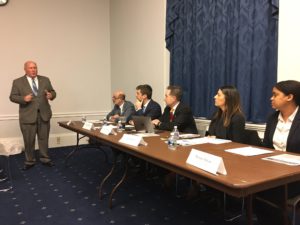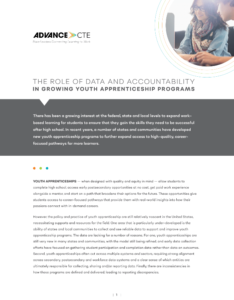 On Wednesday, November 20, the Congressional Career and Technical Education (CTE) Caucus held a briefing on Increasing Access and Equity in Career & Technical Education. During the briefing, panelists discussed challenges to increasing access and equity in CTE, ongoing efforts to address gaps and how the Strengthening Career and Technical Education for the 21st Century Act (Perkins V) can help to close equity gaps.
On Wednesday, November 20, the Congressional Career and Technical Education (CTE) Caucus held a briefing on Increasing Access and Equity in Career & Technical Education. During the briefing, panelists discussed challenges to increasing access and equity in CTE, ongoing efforts to address gaps and how the Strengthening Career and Technical Education for the 21st Century Act (Perkins V) can help to close equity gaps.
Co-Chair of the Congressional CTE Caucus, Congressman Glenn “G.T.” Thompson (R-PA), joined the session and gave remarks to the group. Congressman Thompson voiced his support for high quality CTE programs, and expressed the urgent need to improve access and equity to and within these programs. He shared that “the power of work must be accessible to everyone, and CTE offers significant opportunities.”
The full panel represented the state, local and employer perspectives, and included:
- David Abromowitz, Chief Public Policy Officer, YouthBuild USA
- John LeTourneau, Director of Manufacturing, Anoka area chamber of Commerce
- Brianna McCain, Policy Associate, Advance CTE (Moderator)
- Nina Salomon, Deputy Program Director, Corrections & Reentry, Council of State Governments
- Spencer Sherman, Director, Office of College and Career Readiness, Rhode Island Department of Education
Advance CTE’s Brianna McCain started off the briefing by discussing the history and current trends of access and equity in CTE, as well as how states can leverage Perkins V to support high quality CTE for each and every learner. Brianna pointed out that as the quality of CTE programs has significantly improved, the nature of the equity challenge in CTE has changed. Today, a renewed focus must be placed on ensuring equitable access to these high-quality programs.
All panelists agreed that it is essential to collaborate across agencies and with employer and community representatives. This is the way to ensure that all populations are being reached, and that programs are developed to set learners up for success. When speaking about the juvenile justice population, Nina Salomon shared how she found that most juvenile justice agencies are not partnering with workforce agencies, education agencies or employers. This led to a disconnect in all groups understanding what resources are available, including federal funding opportunities through Perkins and WIOA. Therefore, administrators have been missing out on opportunities to provide education and training in juvenile justice systems.
Check out Advance CTE’s Making Good on the Promise series to learn more about how states can leverage data to identify and address equity gaps, rebuild trust with historically underserved communities, expand access to high-quality CTE for each and every learner and build systems to ensure learner success.
Meredith Hills, Policy Associate


 This week, short-term funding bills were passed in the House and Senate. Read below to learn more about the appropriations process, the newly expanded College Scorecard, new bills on career counseling and postsecondary apprenticeships, Advance CTE’s participation in last week’s Data Quality Institute and how Secretary of Education Betsy DeVos voiced support for connecting education and the workforce.
This week, short-term funding bills were passed in the House and Senate. Read below to learn more about the appropriations process, the newly expanded College Scorecard, new bills on career counseling and postsecondary apprenticeships, Advance CTE’s participation in last week’s Data Quality Institute and how Secretary of Education Betsy DeVos voiced support for connecting education and the workforce.  efforts to coordinate across systems and strengthen career readiness training. Delaware, for example, is building out its capacity to increase postsecondary attainment by scaling regional career pathways and work-based learning. Similarly, Rhode Island is leveraging its
efforts to coordinate across systems and strengthen career readiness training. Delaware, for example, is building out its capacity to increase postsecondary attainment by scaling regional career pathways and work-based learning. Similarly, Rhode Island is leveraging its  In Massachusetts, Career/Vocational Technical Education Schools (CVTE) are renowned for offering rigorous, high-quality programs of study across a variety of disciplines. While CVTE graduates have always experienced high rates of success academically and in their careers, state leaders in Massachusetts wanted to know whether these outcomes directly result from the CVTE model. In 2017, the Massachusetts Department of Elementary and Secondary Education partnered with Shaun Dougherty (at the time, a researcher at the University of Connecticut),
In Massachusetts, Career/Vocational Technical Education Schools (CVTE) are renowned for offering rigorous, high-quality programs of study across a variety of disciplines. While CVTE graduates have always experienced high rates of success academically and in their careers, state leaders in Massachusetts wanted to know whether these outcomes directly result from the CVTE model. In 2017, the Massachusetts Department of Elementary and Secondary Education partnered with Shaun Dougherty (at the time, a researcher at the University of Connecticut),  Youth apprenticeship programs can give students access to valuable work-based learning experiences that provide insights into how their interest can connect to education and the workforce. Although these programs are often beneficial for participants, there is little data to show the programmatic landscape and impact. A lack of data inhibits the development and expansion of youth apprenticeship programs.
Youth apprenticeship programs can give students access to valuable work-based learning experiences that provide insights into how their interest can connect to education and the workforce. Although these programs are often beneficial for participants, there is little data to show the programmatic landscape and impact. A lack of data inhibits the development and expansion of youth apprenticeship programs.  This week, the House Education and Labor Committee voted on the College Affordabili
This week, the House Education and Labor Committee voted on the College Affordabili